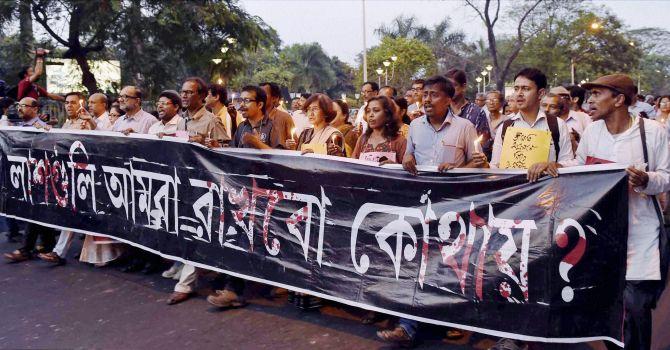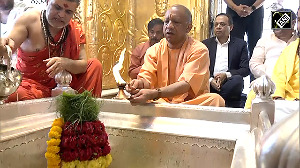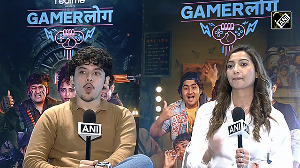 Bangladesh on Monday banned an Islamist militant outfit that is believed to be behind the gruesome hacking deaths of three secular bloggers in recent months that have evoked outrage in the country and across the globe.
Bangladesh on Monday banned an Islamist militant outfit that is believed to be behind the gruesome hacking deaths of three secular bloggers in recent months that have evoked outrage in the country and across the globe.
The Bangladesh government banned Ansarullah Bangla Team for its militant and anti-state activities with the home ministry publishing a gazette notification in this regard. It is the sixth such organisation to be outlawed for militant activities.
"We had taken the decision to ban the outfit earlier this week on the basis of a police report...we are implementing this decision today," State Minister for Home Affairs Asaduzzaman Khan Kamal told media persons.
The ban comes at a time when three bloggers and writers have been killed in less than three months and the Ansarullah Bangla Team is suspected to be behind the killings. Earlier this month, machete-wielding masked men hacked to death Ananta Bijoy Das, 33, a secular blogger, in Sylhet city.
Assailants in February had killed Avijit Roy, 45, a Bangladeshi-born US national, in Dhaka while his wife narrowly escaped the attack. A month after Roy's killing, another blogger Washiqur Rahman was murdered in similar fashion in Dhaka but people in the neighbourhood nabbed two suspected killers from the scene and handed them over to the police.
The police has so far arrested several activists of ABT in connection with the murders. Investigators earlier said they suspected that the outfit was closely linked to al-Qaeda. Das' murder was claimed by Al Qaeda in the Indian Subcontinent.
The terror group made the claim in a post on justpaste.it and ABT tweeted a link to the post. Ten prominent Bangladeshis, including Prime Minister Sheikh Hasina's adviser H T Imam and Vice Chancellor of Dhaka University Professor Arefin Siddique, recently received death threats and police suspected the ABT send the threat letters in the name of Al Qaeda.
Ansarullah Bangla Team is the sixth organisation to be outlawed in Bangladesh with the other five being, Hizb ut-Tahrir, Jama'atul Mujahideen Bangladesh, Harkatul Jihad Bangladesh (Huji), Jagrata Muslim Janata of Bangladesh and Shahadat-e Al-Hikma.
Four members of ABT outfit have given confessional statements in blogger Rajib Haider murder case. Haider was the first victim of the suspected Islamists who killed him in 2013. International security think tank Terrorism Research and Analysis Consortium describes ABT as an "Al Qaeda- inspired Islamic extremist group in Bangladesh that started its activities during 2007 as the Jama'atul Muslemin."
It said the group was funded by different NGOs and it ceased to operate when funding ended but the outfit resurfaced during 2013 as the ABT.
According to TRAC, the outfit is influenced by renowned extremist ideologues such as Anwar Al-Awlaki and its objectives include the radicalisation of youths in Bangladesh, inciting active participation in local jihad and seeking control of areas in the country.
The ABT first came into prominence in August 2013 when police said that it planned to kill a dozen high-profile people after a hit list was seized during an investigation against the group.
The ban came as outrage and protests over the brutal murders of the three bloggers continues. Bangladesh has also been taking the help of US' Federal Bureau of Investigation in Roy's murder case.
A twitter account in the name of ‘Ansar Bangla 7’ had described Roy's murder as an "achievement". "A great success today here in #Bangladesh. Target is Down," it said in another tweet.
A series of subsequent tweets called the murder as a punishment for "crime against Islam". Protests were mounting across the Bangladeshi capital with civil society figures and youngsters staging rallies and major newspapers carrying editorials demanding justice for the murdered bloggers.
Bangladesh had witnessed emergence of several Islamist militant outfits including JMB and HuJI in early 2000s when the Bangladesh Nationalist Party led right-wing four-party government with fundamentalist Jamaat-e-Islami being its major partner.
The situation prompted authorities to order a crackdown on the militant groups and hunt down their leaders. Subsequent regimes intensified the clampdown which officials said put severe curbs on these outfits.
The militants have resurfaced particularly under the banner of ABT recently as the country witnessed political unrest from January to April when ex-premier Khaleda Zia-led BNP launched a violent non-stop nationwide blockade that resulted in the death of nearly 130 people, mostly in clandestine arson attacks on buses and trucks.
The Brussels-based International Crisis Group earlier this year said the extremists and criminal networks could exploit the resulting political void caused by extreme hostility between Prime Minister Sheikh Hasina's ruling Awami League and her arch-rival Zia's BNP.
"Violent Islamist factions are already reviving, threatening the secular, democratic order. While jihadi forces see both parties as the main hurdle to the establishment of an Islamic order, the Awami League and the BNP perceive each other as the main adversary," the ICG report read.





